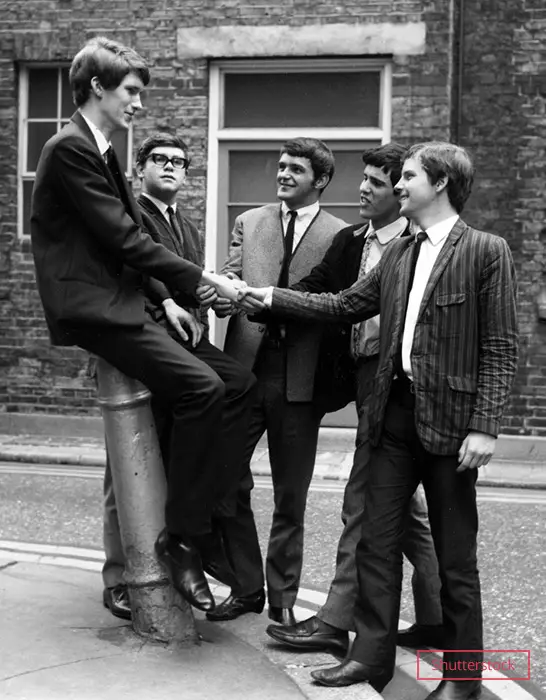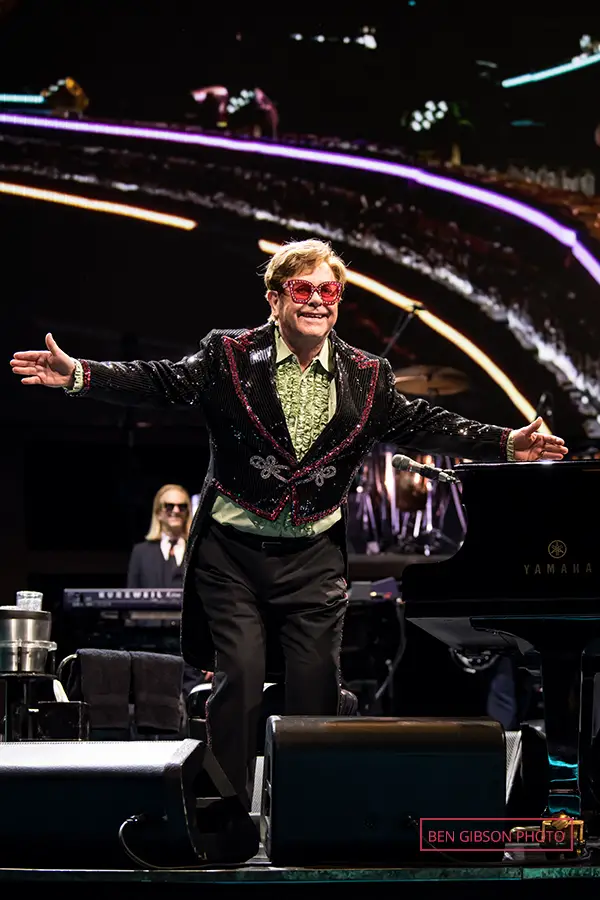Elton John: From best-selling physical single to highest-grossing music tour EVER
The man born with the distinctly un-rock-star name of Reginald Kenneth Dwight has gone on to become one of history’s most successful musical artists.
Since his breakthrough in the 1970s, he has cemented his status as a pop icon, with a wealth of classic songs and best-sellers to his name.
Elton John has had 130 Top 40 hits in the USA and UK, and played some 3,500 gigs during his lifetime.
He is the most successful British solo artist, having racked up seven US No.1 albums and eight UK No.1 albums, and hit singles stretching back to 1970.
More than 50 years after the start of his career, he remains a hugely popular live draw: his Farewell Yellow Brick Road concerts, which kicked off in 2018 and are due to finish on 8 Sep 2023, represent the all time highest-grossing music tour.
Between September 2018 and Jan 2023, it had taken $817.9 m (£660 m), surpassed Ed Sheeran’s ÷ Tour in 2017–19. And he still had 51 shows to go.
Piano prodigy
Even as a child growing up in the London suburb of Pinner, Elton had shown unusual musical talent, able to play back pieces that he’d heard only once.
Like many children of his generation, he soon gravitated towards the thrilling sounds of rock’n’roll from America. Even as a schoolboy, he began mimicking the wild showmanship of firebrand keyboardist Jerry Lee Lewis. By the time he was a teenager, he was sporting black-rimmed glasses (although his eyesight was perfect) in homage to another pioneering rock’n’roller, Buddy Holly.

Aged 11, Elton had shown enough promise to earn himself a scholarship at London’s prestigious Royal Academy of Music.
For five years, he attended Saturday-morning classes there, but found it intimidating and chafed against the restrictions of learning only about classical music. Disillusioned, he began skipping lessons and eventually left without sitting his finals.
In 1962, he formed five-piece group Bluesology with four friends. They went on to serve as backing band for established American soul and R&B acts such as the Isley Brothers and Lee Dorsey, but never broke into the big time themselves.
With fame continuing to elude him, Elton quit the group in 1967 to branch out as a solo artist.
It proved to be an inspired move, not least because shortly afterwards he met Bernie Taupin, an ambitious and gifted lyricist. Initially, the pair set about writing material for other artists, but before long they began concentrating on songs for Elton himself.
The “Rocket Man” takes off
In 1970, the pair had their breakthrough with the ballad “Your Song”, which reached No.7 on the UK listings and No.8 in the USA, helping to kickstart Elton’s phenomenal popularity Stateside.
It was to be the first of a run of memorable singles that saw Elton become one of the 70s’ biggest stars, while its parent album, Elton John, was a transatlantic Top 5 smash. In 1972, perhaps buoyed by his growing success, he officially changed his name to the boldly assertive Elton Hercules John!
The hits that followed included modern-day pop standards such as “Rocket Man”, “Crocodile Rock” (a Billboard Hot 100 chart-topper and his first-ever No.1), “Daniel”, “Goodbye Yellow Brick Road” and “Philadelphia Freedom”.
His 1975 album Captain Fantastic and the Brown Dirt Cowboy was the first album to debut at No.1 on the US albums chart. Later that year, in a record-breaking double, Rock of the Westies repeated the feat.
Every album from 1972’s Honky Chateau to Rock of the Westies became a Billboard No.1, a tally of seven chart-toppers (including one “Greatest Hits” set) unmatched by any other artist during the 1970s.
TV performances of “Your Song” had presented a serious, besuited songsmith seated at his piano.
But that was before Elton caught the glam-rock wave that hit the British charts in the early 70s, and enthusiastically went about transforming his image.
Inspired by the likes of Marc Bolan and David Bowie, Elton began sporting glittery costumes that boasted exotic displays of feathers, ostentatious headwear and capes, accompanied by vertiginous platform heels and, famously, an increasingly bizarre array of glasses.
In 1975, he donned a sequinned LA Dodgers outfit for a series of gigs at the team’s home stadium; a years later, in the spirit of the American bicentennial celebrations, he dressed up as the Statue of Liberty.
In the vein of piano-pounding heroes such as Jerry Lee Lewis and Little Richard, Elton began leaping on to (and off) his instrument on stage, urging his ecstatic audiences on.
In one famous stage trick, he appeared to levitate while pounding away at the piano.
All of which proved that this was a superstar who didn’t take himself too seriously, as his scene-stealing cameo appearance in the 1975 movie Tommy (UK, directed by Ken Russell) proved.
His spectacular success allowed Elton to indulge himself, and make a few boyhood dreams come true along the way.
A devoted Watford FC fan, Elton had been attending matches at the team’s Vicarage Road home ground from the age of five, with his father.
In 1976, he bought the club and became its chairman and president, roles that he held until 1987.
Under his stewardship, and the inspired choice of Graham Taylor as manager, the team went from bottom of the entire football league to the very top!
And over the years, when the club has hit financial difficulties, Elton has stepped in on more than one occasion to play a fund-boosting concert. He remains Watford’s Honorary Life-President.
Confronting the AIDS epidemic
The hits continued into the 1980s, but as the decade wore on global events inspired the singer to embrace new directions.
In 1992, having been deeply affected by the death of friends who had contracted the human immunodeficiency virus (HIV), he created the Elton John AIDS Foundation (EJAF).
To date, EJAF has raised more than $600 million to fund HIV projects in 55 countries. It supports care for those who live with HIV and oversees educational programmes about the disease. For its vital work, the Foundation earned the Global Impact prize at the 2020 British LGBT Awards.
Elton’s knighthood in 1998 reflected not only his services to music, but to EJAF and contributions to more than 100 other worthy causes.
In 1992, Elton revealed to Rolling Stone magazine that he was gay, and very happy to be so. In less enlightened times, “coming out” could have jeopardized an artist’s career, but by now Elton had acquired the mantle of national treasure that he still has today.
He’d eventually marry his long-term partner, David Furnish (now chairman of EJAF), in 2014 and the couple have two boys, both to the same surrogate parent.
Read everything about how Elton John's recent iconic tour smashed a world record!

Record breaking – on stage and in the charts
Commercially, Elton hit another high with songs for the Disney blockbuster The Lion King (1994).
Co-written with lyricist Tim Rice, they included much-loved favourites such as “Can You Feel the Love Tonight”, which won the pair an Academy Award for Best Original Song, and “Circle of Life”.
The duo penned three more numbers for the stage adaptation, which premiered in 1997. The highest-grossing musical theatre franchise, it has now taken more than $9.1 bn (£7 bn) around the world.
Sadly, that same year saw the untimely death of Diana, Princess of Wales – one of Elton’s close friends and a fellow campaigner who did much to demystify phobias and prejudice surrounding AIDS.
Devastated by her loss, he reworked his poignant ballad “Candle in the Wind” – originally written about Marilyn Monroe – as a tribute to Diana, performing it live, for the only time, at her funeral in Westminster Abbey.
The song is a heartfelt tribute to Diana, and it opens with the touching lyrics: "Goodbye England's rose, may you ever grow in our hearts."
“Candle in the Wind 1997” (accompanied by “Something About the Way You Look Tonight” on its flip side) went on to become the best-selling physical single since charts began, and has sold some 33 million copies to date.
It remains the UK’s best-selling single, with an unrivalled 4.9 million copies sold, and received the first Diamond certificate awarded to a US single for sales of 10 million.
Happily, Elton’s trademark flamboyance occasionally makes a spectacular reappearance over the years – and not only for his stage performances.
In 1997, for his 50th birthday celebrations, he arrived as the “Sun King” Louis XIV.
His feather-flecked costume was highlighted by a 3-ft-high (0.9-m) wig. To complete the look, nestled within it were a small warship and cannon.
His commercial success has continued smoothly into the 21st century.
The year 2019 saw both his best-selling autobiography and the widely acclaimed biopic Rocketman (directed by Dexter Fletcher, UK, 2019), which earned him a second Academy Award for the song “I’m Gonna Love Me Again”.
Elton’s plaudits keep company with 10 Ivor Novello trophies, his six Grammys including a Grammy Legend Award – from 34 nominations – and a Tony Award.
In 2020, he became the proud recipient of an honorary doctorate from the Royal Academy of Music.
The ex-pupil who left before sitting his final exams has now set up the Elton John Scholarship Fund to support eight gifted students per year, who otherwise would not be able to afford the Academy’s fees.
